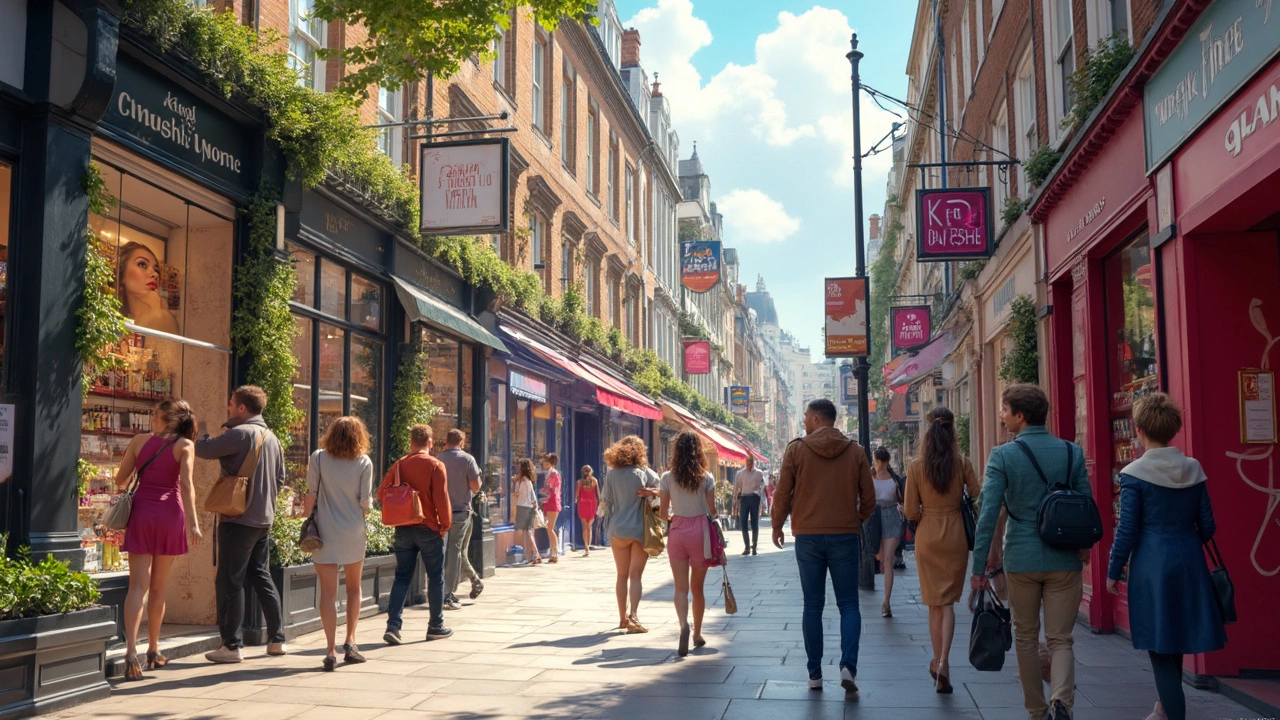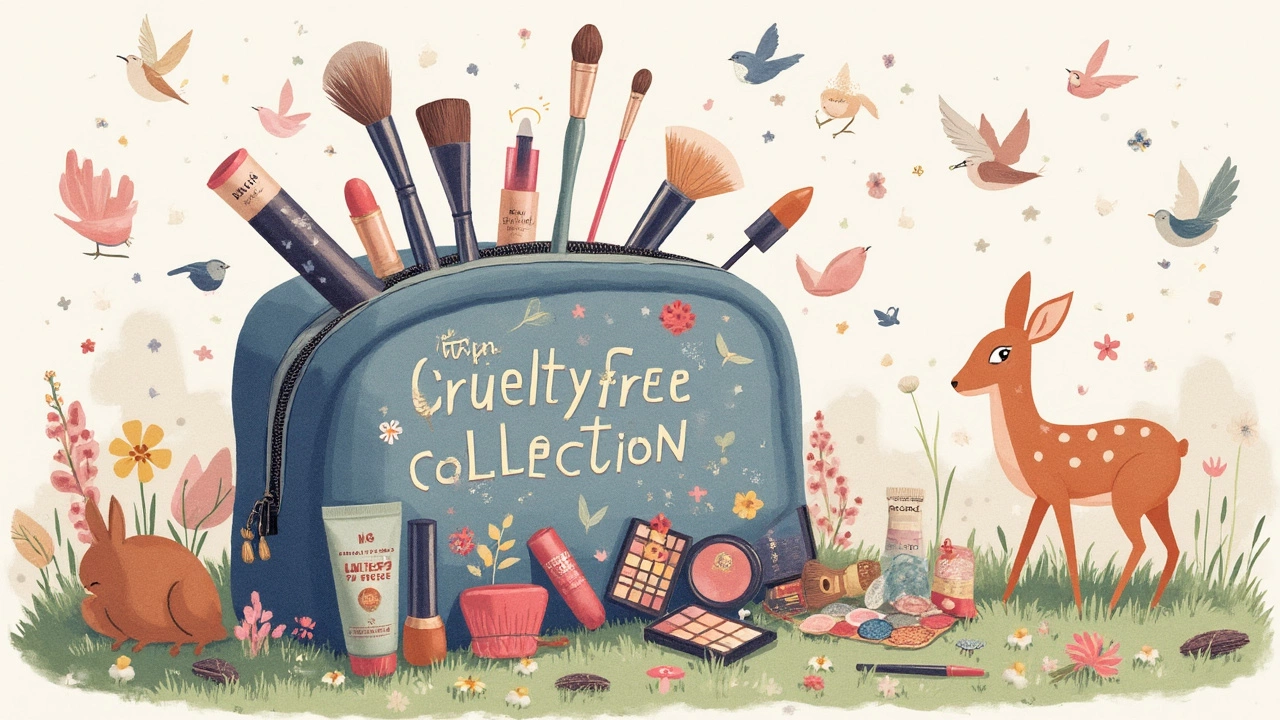
Animal testing in the beauty world? Sadly, it's still a thing for some brands. But before you start feeling guilty about your lipstick, let's get the lowdown on why this happens and what you can do about it. Some companies say they test because of regulations in certain countries, like China, where animal testing for cosmetics was required until recently, even for products sold there—crazy, right?
But here's the good news: a ton of brands have ditched animal testing and gone for more ethical options. The market for cruelty-free makeup is booming, and it's way easier to find these products than you might think. Next time you're eyeing a new shade of blush, look for those little icons that tell you it's cruelty-free.
Wondering how to make sure your beauty stash is kind to animals? Keep an eye out for certifications like Leaping Bunny or PETA's cruelty-free logo. These stamps are your best friends in the quest for ethical beauty buys. And remember, by choosing cruelty-free, you're sending a message to the industry that animal testing isn't cool.
- The Reality of Animal Testing
- Why Some Brands Still Test
- Global Laws and Regulations
- How to Spot Cruelty-Free Products
- Top Cruelty-Free Brands
- The Future of Makeup Testing
The Reality of Animal Testing
Imagine fluffy bunnies and cute mice being used in labs to test beauty products. It sounds pretty harsh, right? But that's been a reality for some makeup brands. Animal testing in the cosmetics industry involves using animals to test the safety and effectiveness of new products before they hit the shelves.
Why do some companies still test on animals? Mainly because they want to make sure products are safe for humans. However, with today's tech and science, there are more humane options available, like computer modeling and cell cultures. These alternatives can provide equally safe results without putting animals through the wringer.
It's not just about what the companies want; sometimes, it's about where they sell. For example, until 2021, China had regulations that required animal tests for all imported cosmetics. This meant brands wanting to sell in China had to comply, though recent changes in the law are beginning to shift towards accepting cruelty-free alternatives.
According to the Humane Society International, around 500,000 animals suffer from this testing each year, often going through painful procedures. Countries and regions like the European Union, India, and Israel have banned animal testing for cosmetics, influencing more companies to ditch the practice.
So, while some makeup companies persist with animal testing, there's a strong movement towards more ethical and cruelty-free makeup options. This shift is making a big splash in the beauty industry, and more brands are stepping up to create products that are both safe and kind.
Why Some Brands Still Test
So, why on earth would some companies still rely on animal testing when alternatives exist? Well, it's mostly about regulations in different parts of the world. For instance, China has been one of the main culprits. Up until recently, they required animal testing for all imported cosmetic products. This meant even if a brand was cruelty-free everywhere else, selling in China forced them to test on animals.
Another reason some brands continue with this practice is the fear of potential legal problems. In certain places, adhering to strict safety regulations might seem easier with a history of animal-tested data as a safety net. It's not always about being cold-hearted. Think of it as more of a fear of change or losing business.
The hope is strong, though, with changes on the horizon. As of May 2021, China has started allowing exemption from animal testing for general cosmetics like makeup, skincare, and haircare products. This is a big step forward. Progress in global laws means brands have fewer reasons to cling to outdated animal testing methods.
But it’s not only about regulations. Some companies believe animal testing gives them more comprehensive results, especially for products involving new chemical ingredients. This reasoning is becoming less accepted, thanks to scientific leaps in technology offering alternative testing methods.
As the call for cruelty-free makeup grows louder, and consumer demand sways markets, companies are feeling the urge to reevaluate their positions. The beauty industry is seeing a wave of change, and more big players are hopping on board, recognizing that going cruelty-free isn't just ethical—it's also trending and beneficial for their brand reputation.
Global Laws and Regulations
So, what's the deal with animal testing laws around the world? It's a mixed bag, really. Some places are stricter than others, and it makes navigating the beauty industry a bit of a challenge. Let's break it down.
In the European Union, they pretty much set the gold standard. Since 2013, there's been a complete ban on selling cosmetics tested on animals. That means any new product on the EU market must be made without any animal testing, period. It’s a win for cruelty-free makeup lovers!
But across the globe, it's not so straightforward. In the US, for example, there isn't a nationwide ban, but states like California, Illinois, and Nevada have taken things into their own hands and banned it locally. It shows progress, but many are calling for federal changes to make it consistent everywhere.
And then there's China, which for a long time insisted on animal testing for imported cosmetics. Recently, they've eased up a bit. As of 2021, imported non-special use cosmetics don't have to be tested on animals. It's a step forward, but they could still improve.
Here's a quick look at how some key places regulate animal testing:
| Region | Status on Animal Testing Ban |
|---|---|
| European Union | Complete Ban |
| USA | State-Level Bans Only |
| China | Partial Relaxation for Certain Products |
So, as you can see, understanding the legal landscape helps you navigate your way to more ethical choices. Keeping up with ethical cosmetics means having an ear to the ground on where products come from and knowing how they're tested, or not tested, as it should be!

How to Spot Cruelty-Free Products
So you're ready to swap your beauty products for ones that are kind to animals? Awesome choice! But how do you tell which ones are actually cruelty-free? It can be a bit like finding a needle in a haystack, but no worries, I've got your back.
First thing's first—labels! Check the packaging for logos or certifications that scream 'I don't test on animals!' The most recognizable ones are the Leaping Bunny and PETA's cruelty-free bunny. These logos mean the brand has been vetted and is serious about not using animal testing.
If you're browsing online, check the brand's website. Serious cruelty-free companies like to brag about it, and they usually have a whole section dedicated to their animal-friendly stance.
Need more help? Here's a quick list of steps:
- Look for logos: The most common is the Leaping Bunny. If it’s got the bunny, it’s in the clear.
- Read the fine print: Some products say 'cruelty-free' just to hook you, but they might not be certified.
- Do a quick online search: Double-check the company's claims by looking them up. There are tons of cruelty-free beauty lists on the web—use them!
If you’re still unsure, consider using apps designed to help you spot these products. Apps like Cruelty-Free and Bunny Free offer verified info with just a barcode scan—super handy!
Finally, be a bit skeptical about big beauty brands that suddenly claim they’re animal testing-free. While many are shifting away from animal testing under pressure, always verify through trusted certifications. We've all gotta start somewhere, and choosing cruelty-free is a small step toward a kinder world.
Top Cruelty-Free Brands
Choosing cruelty-free makeup isn't just a trend—it's a lifestyle choice that reflects a growing concern for ethical practices in the beauty industry. But with so many labels out there, where should you start? Don't worry, I've got you covered with a rundown of some top brands that don't compromise on their commitment to cruelty-free products.
First up, there's e.l.f. Cosmetics. Known for its affordable prices and wide range of products, e.l.f. is proudly cruelty-free and vegan. They managed to keep their products top-notch without a trace of animal testing, proving high-quality makeup can also be kind.
Then there's Too Faced, the brand with bold colors and a playful vibe. They've ensured their entire line, including their popular eyeshadow palettes, is free from animal testing.
Another standout is Anastasia Beverly Hills. You might know them for their famous brow products and vibrant eyeshadow palettes. They are committed to cruelty-free practices, and it's a go-to for beauty lovers who want ethical cosmetics without compromising quality.
And if you're into luxury beauty, check out Charlotte Tilbury. They not only serve up those glamorous Hollywood-type looks but do so without harming animals.
Finally, we can't forget about Lush. Although more known for skincare and bath bombs, their makeup line also sticks to their staunch cruelty-free and ethical production values.
When you invest in these brands, you're not just getting awesome products. You're also supporting a shift in the beauty industry towards more ethical cosmetics. So go on, fill your makeup bag with goodies guilt-free!
The Future of Makeup Testing
So, what's next for the beauty industry's relationship with animal testing? It's looking promising, thanks to growing consumer demand for cruelty-free makeup and some game-changing technology. Scientists are developing new methods like artificial skin tests and other innovative solutions that don't involve our furry friends. Cool, right?
One of the major shifts is towards in-vitro testing, where human cell cultures are used to evaluate the potential impact of cosmetics. Also, computer models simulate how products might react with human biology, offering a cruelty-free approach that doesn't compromise on safety. These are not just concepts; many companies are already using these methods and shifting away from traditional animal tests.
Interestingly, over the last decade, there's been a noticeable dip in the number of companies conducting animal testing. An increasing number of brands realize that being cruelty-free isn't just good for animals—it's great for their image, too. With consumers becoming more informed and vocal, there's a clear message to brands: cruelty-free is the future. If you're into ethical shopping, this might be your time to shine and support brands making positive changes.
Meanwhile, legislation is catching up. In the European Union, animal testing for cosmetics has been banned since 2013, setting a standard that many countries are beginning to follow. The United States has also seen moves toward a nationwide ban, with some states already enacting their own laws. This global trend hints at a more uniform future where cruelty-free could become the norm.
An optimistic perspective: as more brands embrace these alternatives and regulations tighten, the days of animal testing in cosmetics might be numbered. So, keep an eye out and support those brands leading the charge towards a more humane and ethical world of beauty!